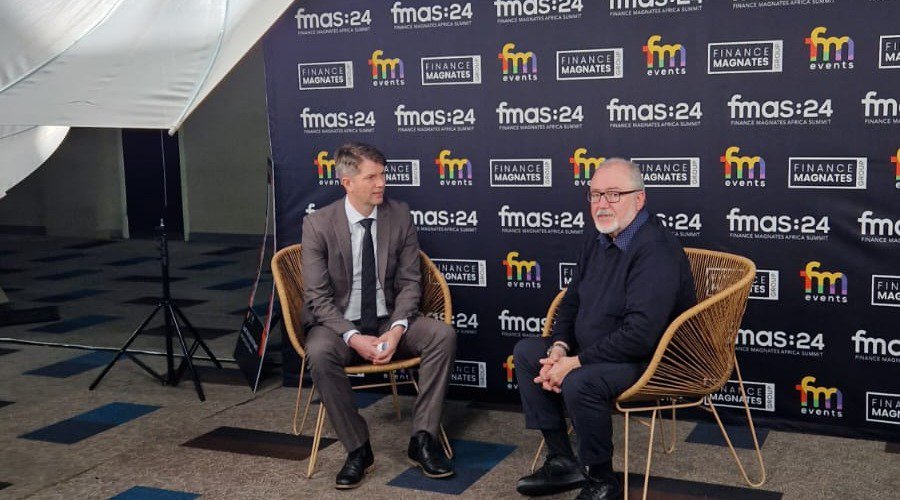Amid the bustling Finance Magnates Africa Summit (FMAS:24) in Johannesburg, South Africa, Gerhard Van Deventer, the Divisional Executive of Enforcement at the Financial Sector Conduct Authority (FSCA), shared crucial advice for new traders on avoiding financial scams in an interview with our very own Adam Button, ForexLive Chief Currency Analyst.
We're at the Finance Magnates Africa Summit, and it's a packed house with hundreds of new traders pouring in. What is the main message you want to tell them?
"I think the main message from our side is certainly talking to the actual traders and the platform owners. Please keep in mind that not everybody can afford the risk of trading in CFDs, trading on platforms, or trading in underlying products like crypto. So, the whole issue of suitability is very important, and that is something that we would really appreciate if our service providers would keep an eye on."
"Our message is always only to deal with regulated entities. Very important, only deal with regulated entities. There's a framework that they must operate in, and there's something we can do if it goes wrong. The problem is there's a trend that we are seeing nowadays of impersonations, so the public has a really hard time because scammers would impersonate one of our regulated entities."
We've seen it's a moving target. The most legitimate brokers often can't offer the same things or make the same claims, making it less tempting for users to trade with them. While promising returns that are way out of reach should be a red flag, what are the different ways scammers lure people to deposit their money?
"You're absolutely right; unrealistic returns are the most important red flag. But there's a more sophisticated problem: impersonations. Scammers impersonate our regulated entities, making it hard for the public. I used to say look out for bad language or incorrect grammar on websites or social media, but scammers have upped their game."
"Now, you might see professional-looking websites. The best advice is to contact the FSCA and check on our website whether the entity is genuine. It's crucial for the public to do their due diligence."
"Is there any way to trade with a non-regulated broker here? There is a way to do it, but is that ever advisable? It's never advisable. We distinguish between a non-regulated person and an unregistered person. An unregistered person is someone who should have a license but doesn't have one, while an unregulated person is someone who doesn't require a license."
It's impressive to see some advertising emphasizing regulation from South Africa and around the world. Consumers often gloss over-regulation, but it's crucial to check if an entity is regulated. You mentioned there are thousands of regulated entities and many more unregulated or impersonating them. What can you tell us about that?
"Absolutely. Our focus is on the unregulated entities because that's where the big risk is. The public often doesn't stand a chance against these scams, so it's essential to do due diligence. Unfortunately, even very smart people can fall for scams because they don't have time to look after their finances. For instance, we've seen doctors targeted because they deal in trust and don't have time to manage their finances."
Influencers seem to be a growing concern. Why is that a red flag?
"Influences is a big issue for the FSCA and it's certainly a focus area for enforcement in the coming year. What you're really doing is you're giving financial advice, and you have influence. You're giving financial advice to people who are not going to think twice about it, and that is really dangerous."
"Before we will grant a license for an intermediary or a broker to provide advice, he or she must convince us that they have the skills, the qualifications, and the experience to give that advice."
What about copy trading? Why is that dangerous for retail traders?
"Copy trading, if you really think about it in the framework of South African legislation, involves a master trader, and whatever instruction goes onto his or her account gets copied onto the copy accounts. It's often not even executed on the master account, so there's no market risk there. It's just traded on the copy accounts."
"What really happens is there's somebody who makes investment decisions on behalf of other people. We have taken some really material enforcement action in the last year on copy trading. What we're really saying to the platform operators is, please don't allow those accounts. They call them M accounts."
"Please don't allow those accounts because nothing good can come of that. The cases that I've seen all ended really badly; those linked accounts traded empty, and there's no recourse."
Given the high-risk nature of financial trading and the many scams, what final advice do you have for new traders who might be tempted by the promise of quick riches?
"There really is no shortcut to getting rich. Yes, there are those guys that just either got very lucky, worked very hard, or were at the right time at the right place, but that is such a small number of traders out there. What the public must understand is that we have investment houses that spend millions on analysts to analyze the markets and do research. They come up with something where you can end up with an acceptable return."
Thanks so much for sharing these important messages. We appreciate your support at the Finance Magnates Africa Summit. We hope to see you again next year.






















